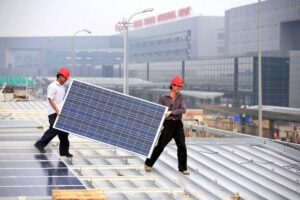Another two eight hour lithium batteries have won contracts under the NSW government’s long duration storage tender, including one that will compete to be the biggest battery project in the country, in terms of megawatt hours of storage.
Ark Energy, part of the Korea Zinc group, is to build a 275 MW, 2,200 MWh lithium-iron phosphate battery at Myrtle Creek, south of Casino in the north of NSW.
It will trump Akaysha’s Waratah Super Battery and the Orana battery in NSW, and Synergy’s 2,000 MWh Collie battery in W.A as the biggest in the country when it is completed.
It is also likely the biggest eight-hour lithium battery in the world, and will likely cost in the region of $1.3 billion.
Another eight hour lithium battery – the Goulburn River project sized at 49 MW and 392 MWh – will be built by Lightsource bp at Merriwa, in the Upper Hunter Valley next to a proposed solar farm, while the previously announced Silver City compressed air storage project at Broken Hill is also a winner of the NSW tender.
See: NSW secures another $4.2 billion of wind, solar and storage to help shift from coal
The long duration storage program was originally set up with pumped hydro storage in mind, but the delays in planning approvals, threats of cost overruns from civil engineering has made it difficult for those projects to get across the line.
In their place has emerged a series of eight-hour lithium ion battery projects, nearly double what previous analysis had judged to be the sweet spot for this technology. Flow batteries are also looking to compete in this space, but most are still in their pilot stage and are not ready for deployment at this scale.
A 50 MW, 400 MWh eight hour lithium battery project at Limondale in the south-west of the state won the only contract in the first long duration storage tender held by the NSW government earlier this year, and will be built near an existing solar project by German energy giant RWE.
But while some dismissed that as a one-off for the technology, the latest wins for Ark Energy and Lightsource suggest that something else is afoot and that lithium ion battery is, once again, defying earlier expectations.
As AEMO Services notes, pumped hydro could not compete in the latest long duration storage tender because developers said it was “too early”, even though it says the technology could provide the lowest cost long duration storage over the longer term.
They still hope to compete in future tenders, but they need to further “de-risk” their projects. They will have the advantage of a longer life, which means they can access to 40 years of revenue certainty, compared to 14 years for the batteries.
The details released by AEMO Services paint an interesting picture of what occurred in the bidding. It says the the maximum “annuity” cap paid to the three storage projects is $150,000 per megawatt, which means for the biggest project, Ark Energy’s Myrtle Creek, the maximum it could receive is $40 million.
However, what is not known is the exact price, or the actual capacity built into that contract. AEMO Services described the price of the bids as “low”.
The annuity cap is designed to act as a floor, and the projects themselves will be seeking higher revenues in the market through the provision of grid services, or arbitrage and storage.
The win by the compressed air storage project in Broken Hill was not a surprise, given that it was all but certain the project was to go ahead after being chosen by Transgrid as its favoured solution to replacing ageing diesel gensets that acted as back-up in the remote mining town.
Canadian technology developer HydroStor plans to build the project at the existing mine owned by Perliya. A contract signed earlier this month with Transgrid means that 50 MW and up up 250 MWh of its capacity will be reserved in case of a planned or unplanned power outage.
That project, however, is expected to be useful to ensure that the two local renewable generators, the 200 MW Silverton wind farm and the 53 MW Broken Hill solar farm, are not so badly constrained as their output can be stored locally.
It is also expected to lead to the creation of a localised renewable mini-grid that will support other mining and industrial projects with low cost and clean and reliable power. Another battery, a 50 MW, one hour battery at Broken Hill is currently being commissioned by AGL Energy.
See RenewEconomy’s Big Battery Storage Map of Australia
Note: This story has been updated to correct the fact that the annuity cap is CPI linked.










